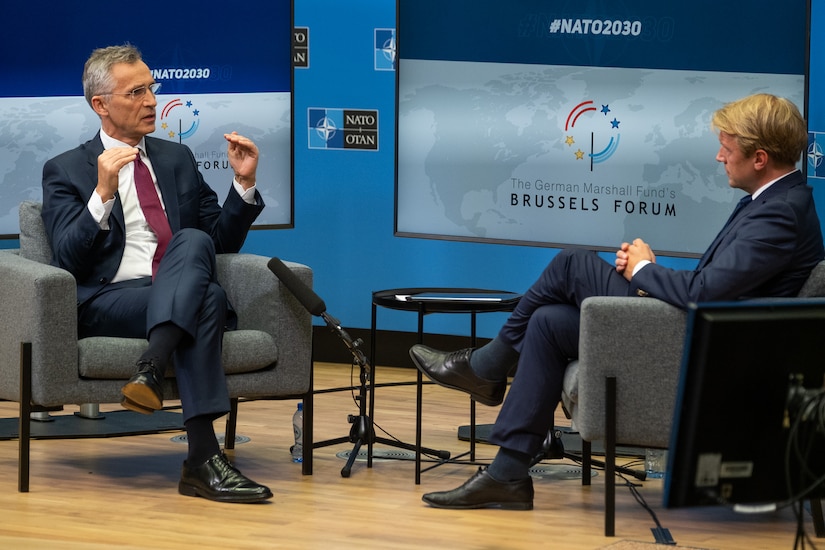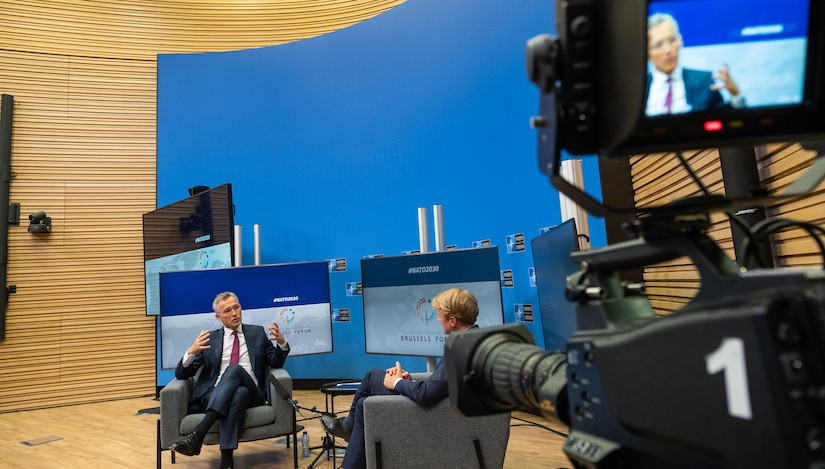The secretary general spoke as part of the Brussels Forum.
Arms control treaties are the best way "to reduce the number of nuclear weapons, and that will make us all safer and reduce the risk of any use of nuclear weapons," he said. "I welcome that Russia and the United States are now sitting down and talking to each other on arms control. But having said that, I also strongly support that China should be involved. China is … a global power. China has a responsibility to be part of global arms control arrangements."
China is modernizing and enlarging its nuclear arsenal and the means of delivery. "We assess that within a decade, China will have doubled the number of nuclear warheads," Stoltenberg said. "That matters for all of us."

China is becoming a more important military power with long-range power projection capabilities. The effect of these moves is felt worldwide. Chinese participation in arms control negotiations would help head off an arms race, Stoltenberg said.
Stoltenberg was asked about the solidarity of the alliance, especially in light of President Donald J. Trump's insistence that allies reach the 2% of gross domestic product invested in defense.
At the same time, Trump is committed to the alliance, Stoltenberg said. "He has also now publicly, several times, recognized that European allies and Canada are investing more," the secretary general said.
Eight of the 30 nations in the alliance spend 2% of GDP on defense, but all have increased spending. Since the summit in 2016, European allies have invested $130 billion more than originally planned. "That helps and it strengthens the solidarity within the alliance," he said.
It remains to be seen what effect the coronavirus pandemic will have on the economies of all nations in the alliance, he said.
Russian presence in Libya concerns the secretary general, and NATO allies have also expressed their concern for the development. "There are differences between NATO allies on the situation in Libya, at the same time, all NATO allies agree that we are concerned about the increased Russian presence in Libya," he said. "This is part of a pattern with more Russian presence in the eastern Mediterranean. We see them in Syria. We see them elsewhere."
Russia has deployed fighter jets and other military capabilities — including Russian mercenaries — to the country. "All allies are concerned about the increased Russian presence," he said. "We also agree that we need to monitor and follow this very closely and share intelligence and information on the increased Russian presence."
Stoltenberg discussed his NATO 2030 initiative at the forum saying the reason the alliance has preserved peace is because of its ability to change.

"Now we have to change again," he said. "It's about keeping NATO strong militarily, it's about strengthening NATO politically and it's about developing a more global approach to NATO."
Part of that will entail the alliance cooperating more fully with the European Union. It also requires a keen eye on China and an awareness of actions in the Mediterranean and into continental Africa.
"One of the purposes of NATO 2030, is to make sure that we adapt, that we change, as we see the world is changing," he said. "This is partly about Russia."
But it is also about China, and the effect of new technologies like artificial intelligence, big data, hypersonics and more.
"We don't regard China as an adversary," he said. "We don't see any threat against any NATO ally. But just the fact that we have such a growing power, which is actually coming closer to us in the Arctic, in Africa, in cyberspace, investing in our infrastructure here in Europe and with weapons systems that can reach all NATO allies, of course matters. That's the reason why this is part of NATO 2030."






No comments:
Post a Comment